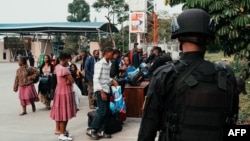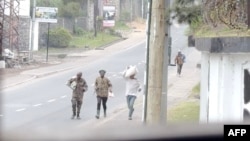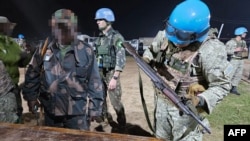Rwandan-backed rebels marched into the center of east Congo's largest city on Monday, witnesses said, in the latest escalation of decades of conflict in a region already suffering one of the world's worst humanitarian crises.
The rebel alliance, spearheaded by the ethnic Tutsi-led M23 militia, said it had captured the whole of the lakeside city, but that could not be independently confirmed.
Gunfire rang out near the airport, city center and border with Rwanda, with two residents reporting ongoing clashes between government-aligned militia and M23 fighters.
"There is confusion in the city. Here near the airport, we see soldiers. I have not seen the M23 yet," one resident told Reuters by phone, asking not to be named.
"There are also some cases of looting of stores."
The eastern borderlands of Democratic Republic of Congo are a tinderbox of rebel and militia fiefdoms stemming from two regional wars after Rwanda's 1994 genocide when Hutu extremists murdered close to 1 million Tutsis and moderate Hutus.
The M23, the latest in a long line of Tutsi-led rebel movements backed by Rwanda, captured Goma in 2012 but withdrew days later after an agreement brokered by neighboring nations.
Congo has more than 100 armed groups, mainly in the east of the central African nation of 100 million people that is roughly the size of Western Europe and has plentiful mineral supplies in the sights of Chinese and Western companies.
Corneille Nangaa, leader of the Congo River Alliance that includes the M23, told Reuters on Monday that his forces were in control of Goma and that army soldiers were laying down arms.
"They have started to surrender, but it takes time," he said. "It's normal that they (residents) still see soldiers."
However, Tryphon Kin-Kiey Mulumba, chairman of the Air Transport Authority, said the army still held the airport.
Uruguay's military said 100 Congolese soldiers had handed weapons over to them at the U.N. peacekeeping mission in Congo (MONUSCO) as requested by the rebels.
There was no immediate comment from Congo's government or military.
U.N. staff vacate
U.N. staff and their families were evacuating to Rwanda on Monday morning, where 10 buses were waiting to pick them up.
Unverified videos shared on social media showed local residents looting merchandise outside the airport customs warehouse and columns of heavily armed men, believed to be M23 fighters, walking through the northern suburbs of the city.
Twenty-six Congolese soldiers and one police officer had crossed the border and surrendered, Rwandan soldiers told Reuters.
Thousands of residents of the Rwandan border town of Gisenyi fled eastward, toward the capital Kigali, as the sound of explosions from Goma grew louder, a Reuters reporter said.
The 2012 fall of Goma led to the deployment of a new offensive-minded U.N. force, an overhaul of the Congolese army, and diplomatic pressure on Rwanda, leading to the M23's defeat the next year and a deal calling for its demobilization.
But the group never fully disarmed and launched a fresh offensive in 2022 that has seen it capture vast swathes of mineral-rich North Kivu province, including lucrative mines that produce coltan, which is used in smartphones.
Well-trained and professionally armed, M23 says it exists to protect Congo's Tutsi population from the Congolese government and ethnic Hutu militias. U.N. experts say Rwanda has deployed 3,000-4,000 troops and provided significant firepower, including missiles and snipers, to support the M23.
The rebels' advance since the start of the year has forced hundreds of thousands from their homes, on top of 3 million displaced in east Congo in 2024, according to the U.N.
The U.N. Security Council held crisis talks on Sunday, with the United States, France and Britain condemning what they said was Rwanda's backing of the rebel advance.
Kigali dismissed statements that "did not provide any solutions" and accused the Congolese government of sabotaging negotiations with the M23 and supporting Hutu militiamen linked to the 1994 genocide.
Kinshasa rejects these allegations.
"The fighting close to the Rwandan border continues to present a serious threat to Rwanda's security and territorial integrity, and necessitates Rwanda's sustained defensive posture," Rwanda's foreign ministry said.
Kenya's President William Ruto, chairman of the East African Community bloc, was to hold an emergency meeting for heads of state on the situation.







